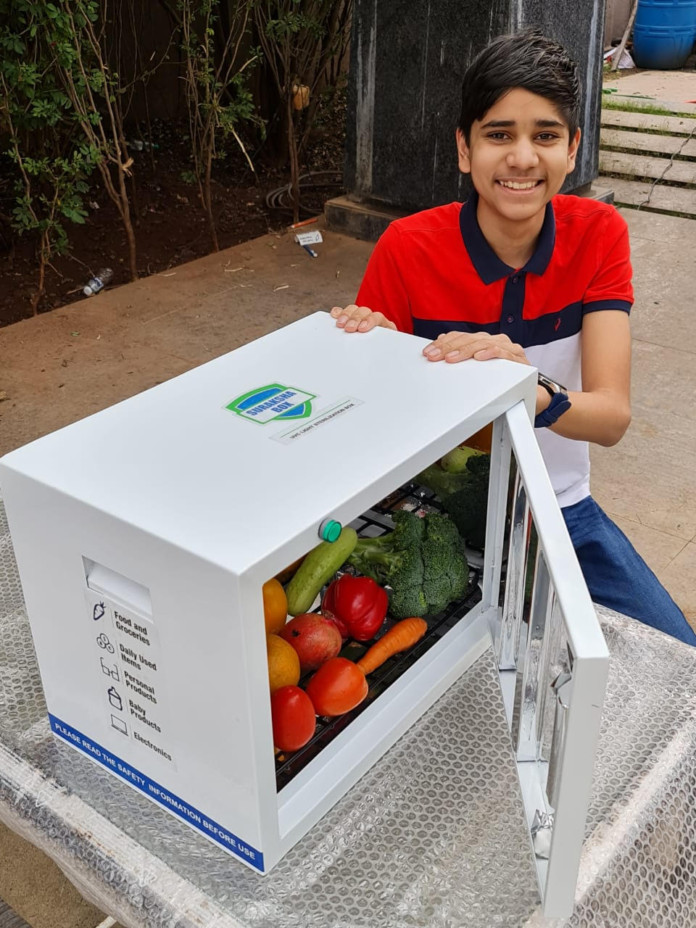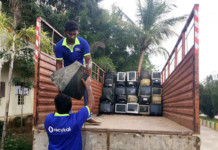The relevance of Suraksha box extends beyond the pandemic. It’s a long-term and affordable solution to the challenge of effectively and quickly sanitizing vegetables and groceries for households and for the vegetable vendors
In the early days of Covid 19, Aditya Pachpande, the 14-year old student entrepreneur who was at home as his school moved to online classes observed his mother spending time and struggling to sanitize the vegetables and groceries being delivered home. Like other children, his first reaction or thought was how do I help my mother. It was then that he recalled reading somewhere about the power of UV light in destroying most known bacteria and viruses including the new coronavirus.
He set out to build a simple box that can be used at home with materials available at home like cardboard for the box, using etc. To his surprise the experiment worked and there has been no looking back since. Suraksha box, the name he coined for his invention now has a government of India (MC&I) patent published besides being approved and certified by CSIR-CMERI (ICMR- approved lab). It has been tested and certified to protect against viruses, bacteria, fungi including COVID-19. And for Aditya this was a red herring moment as it validated his own belief and mission which made him turn a social entrepreneur last year with NextGenInnov8, a non-profit venture. Aditya is currently in Class 8 at Indus international school, Pune.
Says Aditya, “Once the power of innovation is sparked in every child worldwide they will come up with creative ideas and solutions to problems faced by their families, communities and even global issues. Children just need the right guidance, resources and an ecosystem, to support that which is what am trying to do through NextGenInnov8. Have lots of plans in the years ahead to make that happen not just in India but beyond as well.”
He adds, “I must thank my father for his unstinted belief and support in this which has been critical to all that I do. Despite running a large educational group he found the time to take me to different countries and different cities within India, for my talks. He has never stopped me whenever I have tried to do new things or experiments,” he added.
Sandeep Pachpande, Aditya’s father and Chairman, ASM Group of Institutions, said, “Aditya was driven and highly focused on certain things of interest to him beyond what his school demanded. It was his desire to pursue this path and am happy that he has been able to make so much progress and impact in such a short time. As parents, we have kept him focused on his studies as well in the meanwhile, teaching him how to balance both.”
How Suraksha Box Works
The contents kept in the box are 360-degree sterilized by utilising UVC light in a controlled environment. The UVC light used has a range of 240nm which is optimal to destroy the RNA and DNA of most viruses. Bubble wrap aluminium is the material used to reflect UVC light and which makes it easy to clean as well. The boxes have since been used in dozens of vegetable markets, kirana stores, police stations, schools, colleges and salons in Mumbai and Pune to satisfactory results.
The relevance of Suraksha box extends beyond the pandemic. It’s a long-term and affordable solution to the challenge of effectively and quickly sanitizing vegetables and groceries for households and for the vegetable vendors. It’s priced at Rs. 4999/- and is available on Amazon & www.adityapachpande.com among other places.
Aditya is raising money to gift 15,100 Suraksha boxes to vegetable vendors, government schools and deserving households, with 1500+ delivered already for free. Recently his venture also partnered with leading crowd funding site Fueladream to raise funding for this initiative. Aditya says schools have been highly receptive to the idea. Much of the funding till now has come from ASM Group of Institutes, Indus International School, SNBP International School and The Kalyani School among others.
The real test will lie in how many people are willing to buy Suraksha Box for that price. Considering the big need for it, the biggest challenge will be how it can be scaled up. Perhaps he should come up with different sizes for different needs.
Incidentally, Indus School Pune, where Aditya studies, opened the Indus Start Up School in September 2020 to build a culture and mindset of entrepreneurship among the students. It’s the first such initiative anywhere in the world. Students of all three Indus schools – Bangalore, Hyderabad and Pune – close to 3,000, will get an early head-start in entrepreneurship.










